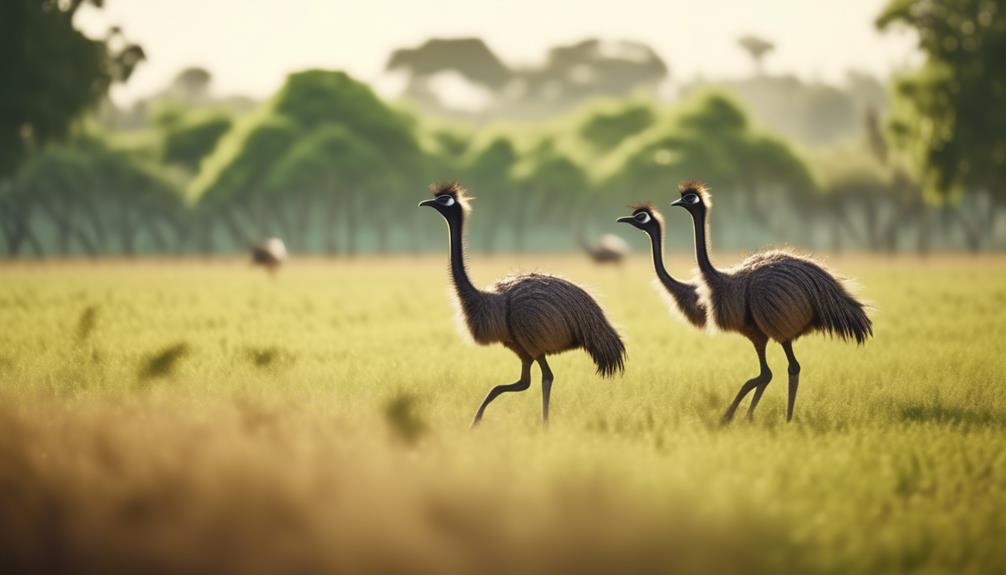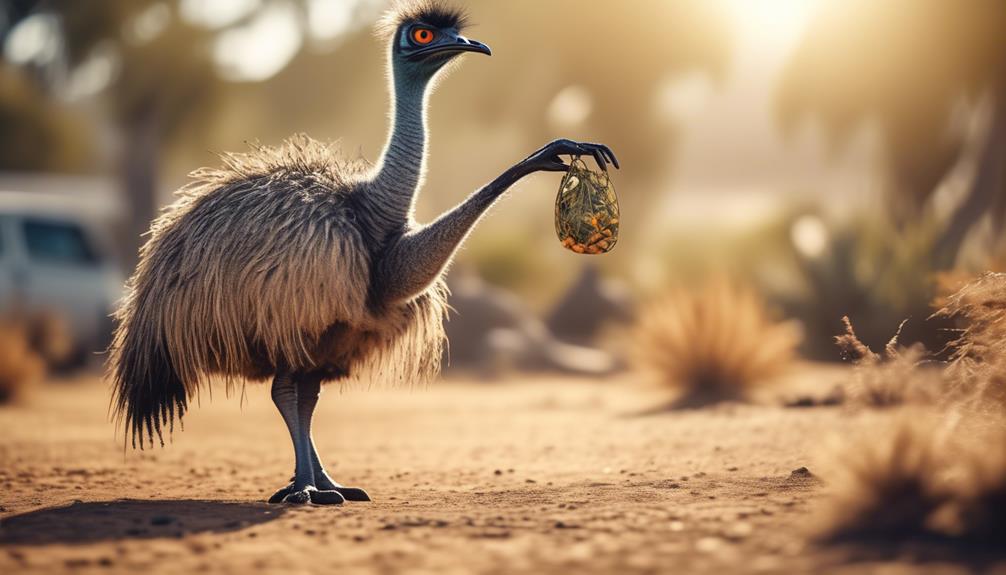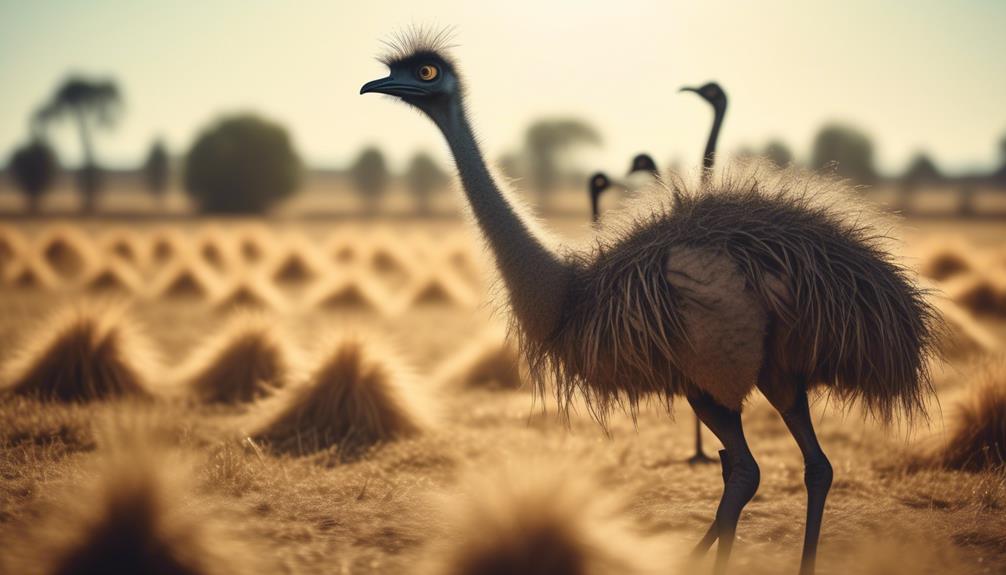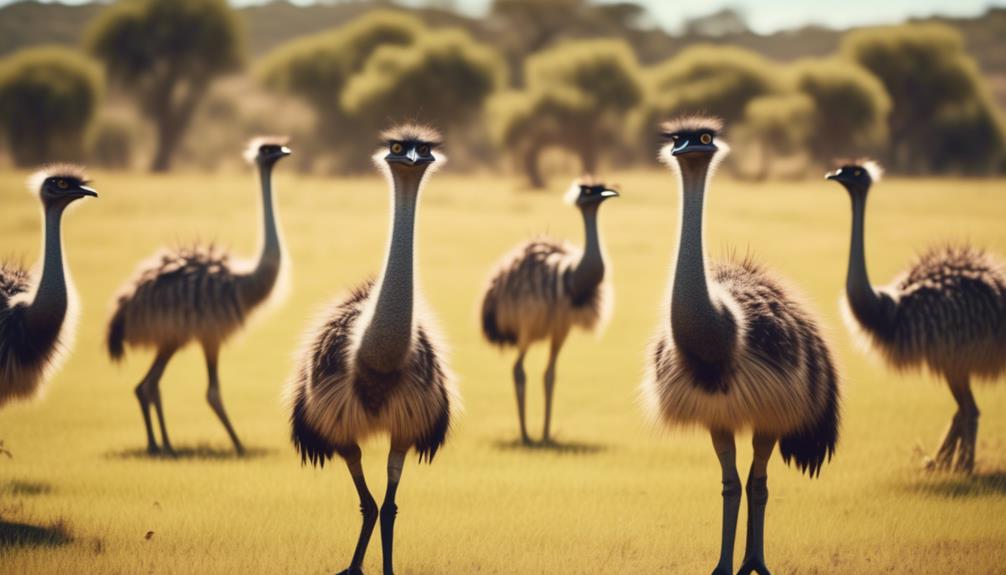
Are you tired of dealing with pesky pests wreaking havoc in your garden or on your property? Well, have you ever considered the potential benefits of utilizing emu birds for pest control?
These majestic creatures possess natural instincts and dietary preferences that make them effective eliminators of various pests. But that's not all – they also have a unique ability to intimidate pests away, acting as natural deterrents.
Intrigued? Stay tuned to discover successful implementation strategies, potential drawbacks, and real-life case studies showcasing the remarkable potential of emu birds in pest control.
Key Takeaways
- Emu birds have natural hunting instincts and efficient foraging abilities, making them effective in controlling a wide range of pests.
- Emus' diet primarily consists of insects and small reptiles, making them highly efficient at reducing pest populations and mitigating economic losses for farmers.
- Emus' intimidating appearance, aggressive behavior, and loud calls act as deterrents, preventing pests from entering fields or gardens.
- Successful implementation strategies for emu pest control include habitat management, regular monitoring, collaboration with stakeholders, training and education, and cost-effectiveness evaluation.
Benefits of Emu Birds in Pest Control
Emu birds offer significant benefits in the realm of pest control due to their natural hunting instincts and efficient foraging abilities. Farmers can utilize emu birds as companions in their pest control efforts, as these large flightless birds are known to consume a wide range of pests including insects, rodents, and even snakes. Emus have a keen sense of sight, which allows them to spot pests from a distance, making them highly effective in detecting and controlling infestations.
One unique benefit of emu birds in pest control is the utilization of their feathers as a natural pesticide alternative. Emus possess oil glands on their skin that produce a waxy substance known as 'preen oil', which they spread over their feathers during grooming. This oil contains compounds that possess insecticidal properties, acting as a deterrent for pests. Farmers can collect emu feathers and distribute them in agricultural fields to deter pests, reducing the need for chemical pesticides.
Furthermore, emu birds are highly adaptable and can thrive in diverse environments. They have the ability to cover large distances in search of food, making them effective in controlling pests over a wide area. Their strong legs and sharp claws enable them to dig and root out pests from their hiding places, ensuring effective pest control.
Emu Birds' Natural Instincts for Pest Control
With their natural instincts finely honed over thousands of years, emu birds possess a repertoire of behaviors that make them formidable predators in the realm of pest control. These large flightless birds exhibit several key behaviors that contribute to their effectiveness in controlling pests:
- Foraging: Emus have a keen eye for spotting pests in their natural habitat. They use their long necks to scan the surroundings and locate insects, rodents, and other small animals that may cause damage to crops or gardens.
- Pecking: Emus have a sharp beak that they use to peck at pests. Their pecking behavior is precise and targeted, allowing them to quickly and efficiently eliminate pests from an area.
- Chasing: Emus are known for their speed and agility. When they detect pests, they can swiftly chase them down and capture them. Their strong legs and powerful strides enable them to cover large distances in pursuit of pests.
- Stomping: Emus have strong legs and large, powerful feet. They use these to stomp on pests, effectively immobilizing or killing them. This behavior is particularly effective against pests that burrow in the ground.
- Vocalization: Emus have a unique vocalization that they use to communicate with each other. This vocalization can also serve as a deterrent to pests, as they may perceive it as a threat and stay away from areas where emus are present.
Emu birds prefer open grasslands and savannahs as their habitat. These environments provide them with ample space to forage and chase pests. They're also well-adapted to arid regions, making them suitable for pest control in areas with dry climates.
Emu Birds' Diet: Effective Pest Eliminators

When considering the diet of emu birds as effective pest eliminators, it's important to understand the specific prey they target and consume. Emus are opportunistic omnivores, which means they eat both plant matter and small animals. However, their feeding habits primarily revolve around insects, reptiles, and rodents, making them highly efficient at controlling pest populations.
Emu birds have a keen eye for spotting insects, such as grasshoppers, crickets, and beetles, which are known to cause significant damage to crops. By consuming these pests, emus help to reduce their numbers and mitigate the economic losses experienced by farmers. Additionally, emus have been observed to prey on small reptiles like lizards and snakes, further contributing to pest control efforts.
It is worth noting that while emu birds play a crucial role in pest elimination, their impact on biodiversity should also be considered. As predators, emus have the potential to disrupt the balance of local ecosystems. Therefore, it's important to monitor their populations and ensure that their predatory behavior doesn't lead to unintended consequences.
Emus as Deterrents: Intimidating Pests Away
Having established the significant role of emu birds in pest control through their diet, it's important to explore their ability to serve as deterrents, effectively intimidating pests away. Emus, known for their large size and distinctive appearance, can be utilized as scarecrows to keep pests at bay. Their behavior and physical attributes make them an ideal choice for this purpose.
Here are five reasons why emus make excellent deterrents:
- Intimidating Appearance: Emus stand at an impressive height of around six feet, with long necks and powerful legs. Their large size alone can intimidate pests, deterring them from entering fields or gardens.
- Aggressive Behavior: Emus are known to exhibit territorial behavior and can become aggressive when threatened. Their loud calls and flapping wings can scare off pests, preventing them from causing damage.
- Speed and Agility: Emus are fast runners and possess great agility. They can quickly chase down intruders, making pests think twice before venturing into areas protected by emus.
- Visual Deterrent: The mere presence of emus can be enough to scare away pests. The sight of these unique birds roaming the area can signal to pests that the location isn't safe for them.
- Low Maintenance: Unlike traditional scarecrows, emus require minimal maintenance. They can be left to roam freely, using their natural instincts to deter pests.
Successful Implementation Strategies for Emu Pest Control

To successfully implement emu pest control, it is crucial to develop a comprehensive strategy that incorporates key elements such as habitat management, monitoring, and collaboration with local stakeholders. By considering these factors, you can effectively mitigate pest issues and ensure the success of your emu pest control program.
Implementing emu pest control may present several challenges that need to be addressed. These challenges include the need for proper training and education of personnel involved in the program, ensuring the availability of suitable habitat for emus, and managing potential conflicts with other stakeholders. Additionally, a cost-effectiveness evaluation should be conducted to assess the financial feasibility of the program.
To help you visualize the key elements of a successful emu pest control strategy, the following table provides a summary:
| Key Elements | Description | Importance |
|---|---|---|
| Habitat Management | Ensuring suitable habitat for emus | High |
| Monitoring | Regular monitoring of pest populations and emu behavior | Medium |
| Collaboration | Engaging with local stakeholders to address concerns | High |
| Training and Education | Providing personnel with the necessary knowledge and skills | Medium |
| Cost-Effectiveness | Evaluating the financial feasibility of the program | High |
Potential Drawbacks of Using Emu Birds in Pest Control
While implementing emu pest control strategies can be effective in managing pest issues, it's important to also consider the potential drawbacks that may arise from using emu birds for this purpose. Here are some potential risks and ethical concerns to keep in mind:
- Injury to Emus: Emus may be at risk of injury when encountering aggressive pests or when attempting to capture them. This can lead to physical harm and stress for the birds.
- Environmental Impact: Emus are large birds and require significant space to roam and forage. Introducing them into ecosystems where they aren't native can disrupt local habitats and ecosystems.
- Predation Risk: Emus are susceptible to predation by other animals, especially when they're focused on hunting pests. This can lead to a decline in emu populations and imbalance in the local ecosystem.
- Ethical Considerations: Some individuals may have ethical concerns about using animals for pest control. They may question the welfare and rights of the emus and argue that alternative methods should be explored.
- Regulatory Issues: Depending on the region, there may be regulations and permits required for the use of emus in pest control. Failure to comply with these regulations can result in legal consequences.
Considering these potential risks and ethical concerns is crucial when deciding to use emu birds in pest control. It's important to carefully evaluate and address these issues to ensure the well-being of the emus and the sustainability of the environment.
Emu Birds: A Sustainable and Eco-Friendly Pest Control Solution

Emu birds offer a sustainable and eco-friendly pest control solution due to their natural hunting instincts and ability to effectively target and eliminate pest populations. These large flightless birds have been found to be excellent companions for organic farming, as they can help control pests without the need for harmful chemical pesticides. Emus have a keen sense of sight and can detect even the smallest movements, making them highly efficient hunters. They are known to feed on a variety of pests such as insects, rodents, and small reptiles, making them versatile in their pest control capabilities.
In addition to their pest control abilities, emu birds can also serve as therapy animals for stress relief in pest-affected areas. The presence of these majestic birds can have a calming effect on farmers and residents who may be dealing with the challenges of pest infestations. Interacting with emus can provide a sense of connection to nature, offering a welcome distraction from the stress and anxiety caused by pest problems.
To further highlight the benefits of using emu birds in pest control, the following table illustrates their effectiveness in targeting and eliminating specific pest populations:
| Pest Type | Emu Birds' Ability to Control |
|---|---|
| Insects | Excellent |
| Rodents | Effective |
| Small reptiles | Efficient |
| Birds | Limited |
| Larger mammals | Limited |
Emu birds' natural hunting instincts, combined with their ability to serve as companions for organic farming and therapy animals, make them a sustainable and eco-friendly pest control solution. Their presence not only helps reduce pest populations but also contributes to a more harmonious and stress-free environment.
Emu Birds in Pest Control: Case Studies and Success Stories
The effectiveness of emu birds in pest control has been demonstrated through various case studies and success stories, showcasing their ability to target and eliminate specific pest populations.
Here are some examples of how emu birds have been successfully used in pest control:
- Case Study 1: Vineyard Pest Control – In a vineyard plagued by grape-loving pests, emu birds were introduced to naturally control the population. Their sharp eyesight and agility allowed them to hunt and consume pests like snails and insects, protecting the vineyard from damage.
- Case Study 2: Agricultural Crop Protection – Farmers struggling with crop-damaging insects found a solution in emu birds. These birds efficiently targeted pests like grasshoppers and beetles, significantly reducing crop losses and the need for chemical pesticides.
- Success Story 1: Mosquito Control – In a suburban neighborhood plagued by mosquitoes, emu birds were introduced to combat the problem. Their voracious appetite for mosquitoes and their larvae helped reduce the population, creating a more pleasant living environment for residents.
- Success Story 2: Tick Infestation Management – Emu birds were used on a farm to control a severe tick infestation affecting livestock. The birds' pecking behavior helped remove ticks from the animals, reducing the risk of disease transmission and improving animal welfare.
- Success Story 3: Garden Pest Eradication – Home gardeners struggling with pests like slugs and snails found relief with emu birds. These birds efficiently hunted and devoured the pests, allowing the gardens to thrive without the need for harmful pesticides.
These case studies and success stories demonstrate the remarkable effectiveness of emu birds in pest control, providing a sustainable and eco-friendly solution to pest management challenges.
Frequently Asked Questions
How Much Do Emu Birds Cost to Purchase and Maintain for Pest Control Purposes?
To purchase and maintain emu birds for pest control, you should consider the cost. However, it's important to note the benefits they provide, such as their ability to eat pests and their low maintenance requirements.
Are There Any Legal Regulations or Restrictions on Using Emu Birds for Pest Control?
Legal implications and environmental impact should be considered when using emu birds for pest control. Regulations may exist to protect native wildlife and ecosystems. Understanding and adhering to these regulations is crucial for the successful and responsible use of emu birds.
Can Emu Birds Be Trained to Specifically Target Certain Types of Pests?
You can train emu birds to target specific pests, like a skilled hunter stalking its prey. Emu bird training techniques allow them to focus on particular types of pests, providing targeted pest control. The benefits of using emu birds for pest control are numerous and effective.
What Is the Lifespan of an Emu Bird, and How Long Can They Effectively Control Pests?
The lifespan of an emu bird varies between 10-20 years. As emu bird predators are minimal, they can effectively control pests throughout their lifetime. Their diet consists of insects, rodents, and vegetation, making them natural pest controllers.
Do Emu Birds Pose Any Risks or Dangers to Humans or Other Animals When Used for Pest Control?
Using emu birds for pest control may pose risks to humans and other animals. Careful consideration must be given to the potential impact on other wildlife during pest control activities to ensure their safety.
Conclusion
In conclusion, the use of Emu birds in pest control has proven to be a highly effective and sustainable solution.
Their natural instincts and diet make them efficient pest eliminators, while their intimidating presence acts as a deterrent for pests.
Successful implementation strategies have been developed, although there are potential drawbacks to consider.
However, overall, Emu birds offer a promising and eco-friendly approach to pest control, as demonstrated by various case studies and success stories.
Emu birds truly are the 'feathered guardians' of pest-ridden areas.




